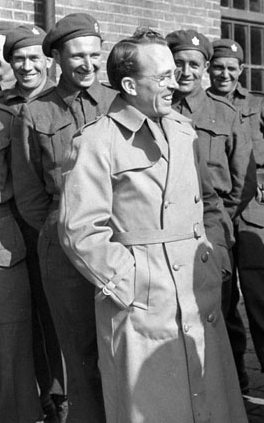Lesson One - An Introduction to Sociology
1.4 Why Study Sociology?
When Bernard Blishen picked up the phone one day in 1961, he was surprised to hear Chief Justice Emmett Hall on the other end of the line asking him to be the research director for the newly established Royal Commission on Health Services. Publically funded health care had been introduced for the first time in Canada that year by a socialist Co-operative Commonwealth Federation (CCF) government in Saskatchewan amid bitter controversy.
Doctors in Saskatchewan went on strike and private health care insurers mounted an expensive anti-public health care campaign. Because it was a Conservative government commission, appointed by Prime Minister John Diefenbaker, Blishen’s colleagues advised him that it was going to be a whitewash document to defend the interests of private medical care. However, Blishen took on the project as a challenge, and when the commission’s report was published it advocated that the Saskatchewan plan be adopted nationally (Vaughan 2004).
Blishen went on to work in the field of medical sociology and also created a widely used index to measure socioeconomic status known as the Blishen scale. He received the Order of Canada in 2011 in recognition of his contributions to the creation of public health care in Canada.
Since it was first founded, many people interested in sociology have been driven by the scholarly desire to contribute knowledge to this field, while others have seen it as way not only to study society, but also to improve it. Besides the creation of public health care in Canada, sociology has played a crucial role in many important social reforms such as equal opportunity for women in the workplace, improved treatment for individuals with mental and learning disabilities, increased recognition and accommodation for people from different ethnic backgrounds, the creation of hate crime legislation, the right of aboriginal populations to preserve their land and culture, and prison system reforms.
The prominent sociologist Peter L. Berger (1929– ), in his 1963 book Invitation to Sociology: A Humanistic Perspective, describes a sociologist as “someone concerned with understanding society in a disciplined way.” He asserts that sociologists have a natural interest in the monumental moments of people’s lives, as well as a fascination with banal, everyday occurrences. Berger also describes the “aha” moment when a sociological theory becomes applicable and understood:
[T]here is a deceptive simplicity and obviousness about some sociological investigations. One reads them, nods at the familiar scene, remarks that one has heard all this before and don’t people have better things to do than to waste their time on truisms—until one is suddenly brought up against an insight that radically questions everything one had previously assumed about this familiar scene. This is the point at which one begins to sense the excitement of sociology (Berger 1963).
Sociology can be exciting because it teaches people ways to recognize how they fit into the world and how others perceive them. Looking at themselves and society from a sociological perspective helps people see where they connect to different groups based on the many different ways they classify themselves and how society classifies them in turn. It raises awareness of how those classifications—such as economic and status levels, education, ethnicity, or sexual orientation—affect perceptions.
Sociology teaches people not to accept easy explanations. It teaches them a way to organize their thinking so that they can ask better questions and formulate better answers. It makes people more aware that there are many different kinds of people in the world who do not necessarily think the way they do. It increases their willingness and ability to try to see the world from other people’s perspectives. This prepares them to live and work in an increasingly diverse and integrated world.
Sociology in the Workplace
Employers continue to seek people with what are called “transferable skills.” This means that they want to hire people whose knowledge and education can be applied in a variety of settings and whose skills will contribute to various tasks. Studying sociology can provide people with this wide knowledge and a skill set that can contribute to many workplaces, including:
- An understanding of social systems and large bureaucracies
- The ability to devise and carry out research projects to assess whether a program or policy is working
- The ability to collect, read, and analyze statistical information from polls or surveys
- The ability to recognize important differences in people’s social, cultural, and economic backgrounds
- Skills in preparing reports and communicating complex ideas
- The capacity for critical thinking about social issues and problems that confront modern society (Department of Sociology, University of Alabama)
Sociology prepares people for a wide variety of careers. Besides actually conducting social research or training others in the field, people who graduate from college with a degree in sociology are hired by government agencies, nongovernmental organizations, and corporations in fields such as social services, counselling (e.g., family planning, career, substance abuse), designing and evaluating social policies and programs, health services, polling and independent research, market research, and human resources management. Even a small amount of training in sociology can be an asset in careers like sales, public relations, journalism, teaching, law, and criminal justice.
